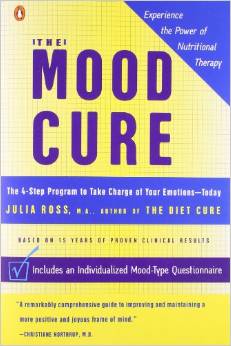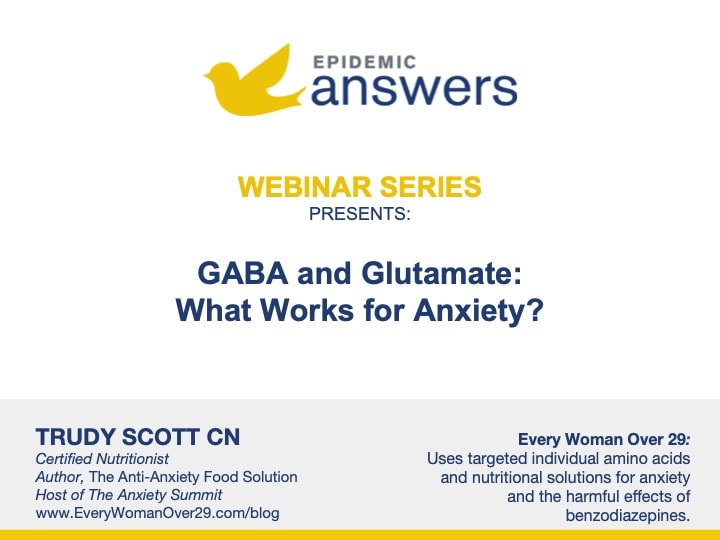Dr. Goldman was a featured panelist after our screening in 2020 of Medicating Normal, a 76-minute documentary film exploring the current mental health care system’s reliance on psychiatric drugs to deal with trauma, grief, and distress.
You can watch the interview below:
As an integrative psychiatrist, Dr. Goldman teaches her patients about nutrition and lifestyle interventions for mental health for children and adults.
In this webinar, we talked about:
- Potential root causes of depression and anxiety such as inflammation and low protein intake
- The neuroimmune aspect of mood and neurological disorders
- How the immune health of the gut affects the function of the brain, especially as it relates to neurotransmitter imbalances
- Dr. Goldman’s top supplement recommendations such as vitamin D, vitamin B12, fish oil, magnesium, 5-HTP, sam-E and micronutrients
- How implementing an elimination diet can help identify sensitivities to foods such as gluten or dairy that may be causing mood symptoms
- How constipation is common in teens with anxiety and depression
- Common blood tests that are helpful to run such as vitamin D, full thryoid panel, fasting insulin, fasting glucose, cholesterol, copper, zinc and CRP (C-reactive protein)
- How excess refined carbohydrate consumption can lead to pronounced blood sugar highs and lows that cause mood symptoms
- How a bioindividual approach can help
- Helpful lifestyle interventions such as restful sleep, biofeedback, exercise, grounding and practicing gratitude
- Helpful therapies such as Cognitive Behavioral Therapy, EMDR, Transcranial Magnetic Stimulation and neurofeedback
Please note that you will be asked to enter your email address after 30 minutes to continuing viewing the interview.
About Laurie Goldman MD IFMCP
Dr. Laurie Goldman is a medical doctor, psychiatrist, and functional medicine practitioner who’s been in private practice since 1999. She founded Clear Path Wellness to help her patients reach their maximum state of mental and physical health using a personalized, comprehensive approach powered by the principles of functional medicine, which treats the whole person, not just symptoms.
Using the science of medicine and the art of holistic healing, Dr. Goldman compassionately guides her patients on a positive and change-oriented journey that promotes growth, holistic health and disease prevention.
You can find out more about her practice at lauriegoldmanmd.com

Disclaimer
This webinar is not a substitute for medical advice, treatment, diagnosis, or consultation with a medical professional. It is intended for general informational purposes only and should not be relied on to make determinations related to treatment of a medical condition. Epidemic Answers has not verified and does not guaranty the accuracy of the information provided in this webinar.
Still Looking for Answers?
Visit the Epidemic Answers Practitioner Directory to find a practitioner near you.
Join us inside our online membership community for parents, Healing Together, where you’ll find even more healing resources, expert guidance, and a community to support you every step of your child’s healing journey.
Sources & References
Atladottir, H.O., et al. The increasing prevalence of reported diagnoses of childhood psychiatric disorders: a descriptive multinational comparison. Eur Child Adolesc Psychiatry. 2015;24(2):173-83.
Bai, S., et al. Efficacy and safety of anti-inflammatory agents for the treatment of major depressive disorder: a systematic review and meta-analysis of randomised controlled trials. J Neurol Neurosurg Psychiatry. 2020 Jan;91(1):21-32.
Bayer, J.K., et al. The Cool Little Kids randomised controlled trial: population-level early prevention for anxiety disorders. BMC Public Health. 2011;11:11.
Bennett, S., et al. Use of modified spectacles and light bulbs to block blue light at night may prevent postpartum depression. Med Hypotheses. 2009 Aug;73(2):251-3.
Bergamaschi, M.M., et al. Cannabidiol Reduces the Anxiety Induced by Simulated Public Speaking in Treatment-Naïve Social Phobia Patients. Neuropsychopharmacology. 2011 (36), 1219–1226.
Berk, M., et al. So depression is an inflammatory disease, but where does the inflammation come from? BMC Med. 2013;11:200.
Bersani, F.S., et al. Deep transcranial magnetic stimulation as a treatment for psychiatric disorders: a comprehensive review. Eur Psychiatry. 2013 Jan;28(1):30-9.
Beyer, K.M.M., et al. Exposure to neighborhood green space and mental health: evidence from the survey of the health of Wisconsin. Int J Environ Res Public Health. 2014 Mar 21;11(3):3453-72.
Bitsko, R.H., et al. Epidemiology and Impact of Health Care Provider-Diagnosed Anxiety and Depression Among US Children. J Dev Behav Pediatr. 2018 Apr 24.
Blessing, E.M., et al. Cannabidiol as a Potential Treatment for Anxiety Disorders. Neurotherapeutics. 2015 Oct; 12(4): 825–836.
Bonnot, O., et al. Children and adolescents with severe mental illness need vitamin D supplementation regardless of disease or treatment. J Child Adolesc Psychopharmacol. 2011;21(2):157-61.
Bora, S.A., et al. Regulation of vitamin D metabolism following disruption of the microbiota using broad spectrum antibiotics. J Nutr Biochem. 2018 Jun;56:65-73.
Boyle, N.B., et al. The Effects of Magnesium Supplementation on Subjective Anxiety and Stress-A Systematic Review. Nutrients. 2017 Apr 26;9(5):429.
Bravo, J.A., et al. Ingestion of Lactobacillus strain regulates emotional behavior and central GABA receptor expression in a mouse via the vagus nerve. Proc Natl Acad Sci U S A. 2011 Sep 20;108(38):16050-5.
Breier, A.B., et al. The GABAA/benzodiazepine receptor: implications for the molecular basis of anxiety. J Psychiatric Res. 1990;24 Suppl 2:91-104.
Camilleri, M. Serotonin in the gastrointestinal tract. Curr Opin Endrocrinol Diabetes Obes. 2009 Feb;16(1):53-9.
Ceylan, M.F., et al. Lipid peroxidation markers in children with anxiety disorders and their diagnostic implications. Redox Rep. 2014;19(2):92-6.
Chu, A.L., et al. Inflammation and Depression: A Public Health Perspective. Brain Behav Immun. 2021 Jul;95:1-3.
Cohen-Cline, H., et al. Access to green space, physical activity and mental health: a twin study. J Epidemiol Community Health. 2015 Jun;69(6):523-9.
Cooney, G.M., et al. Exercise for depression. Cochrane Database Sys Rev. 2013 Sep 12;(9):CD004366.
Costello, E.J., et al. 10-year research update review: the epidemiology of child and adolescent psychiatric disorders: II. Developmental epidemiology. J Am Acad Child Adolesc Psychiatry. 2006 Jan;45(1):8–25.
Darling, A.L., et al. Association between maternal vitamin D status in pregnancy and neurodevelopmental outcomes in childhood: results from the Avon Longitudinal Study of Parents and Children (ALSPAC). Br J Nutr. 2017 Jun;117(12):1682-1692.
Daut, R.A., et al. Circadian regulation of depression: A role for serotonin. Front Neuroendocrinol. 2019 Jul;54:100746.
de Zambotti, M., et al. Insomnia disorder in adolescence: Diagnosis, impact, and treatment. Sleep Med Rev. 2018 Jun;39:12-24.
Dusetzina, S.B., et al. Treatment use and costs among privately insured youths with diagnoses of bipolar disorder. Psychiatr Serv. 2012;63(10):1019-25.
Fagundo-Rivera, J., et al. Relationship between Night Shifts and Risk of Breast Cancer among Nurses: A Systematic Review. Medicina Kaunas. 2020 Dec 10;56(12):680.
Fernandes, A.C., et al. Development and evaluation of a de-identification procedure for a case register sourced from mental health electronic records. BMC Med Inform Decis Mak. 2013;13:71.
Friedman, R.A., et al. Antidepressants’ Black-Box Warning — 10 Years Later. N Engl J Med. 2014 Oct 31;371:1666-1668
Gold, A.K., et al. Treating Circadian Rhythm Disruption in Bipolar Disorder. Curr Psychiatry Rep. 2019 Mar 2;21(3):14.
Guney, E., et al. Oxidative stress in children and adolescents with anxiety disorders. J Affect Disord. 2014;156:62-6.
Heo, J., et al. Effects of smartphone use with and without blue light at night in healthy adults: A randomized, double-blind, cross-over, placebo-controlled comparison. J Psychiatr Res. 2017 Apr;87:61-70.
Hepgul, N., et al. Depression pathogenesis and treatment: what can we learn from blood mRNA expression? BMC Med. 2013;11:28.
Hibbeln, J.R., et al. Vegetarian diets and depressive symptoms among men. J Affect Disord. 2018 Jan 1;225:13-17.
Kappelman, N., et al. Dissecting the Association Between Inflammation, Metabolic Dysregulation, and Specific Depressive Symptoms: A Genetic Correlation and 2-Sample Mendelian Randomization Study. JAMA Psychiatry. 2021 Feb 1;78(2):161-170.
Karakula, H., et al. [Does diet affect our mood? The significance of folic acid and homocysteine]. Pol Merkur Lekarski. 2009;26(152):136-41.
Kelly, J.R., et al. Breaking down the barriers: the gut microbiome, intestinal permeability and stress-related psychiatric disorders. Front Cell Neurosci. 2015 Oct 14;9:392.https://pubmed.ncbi.nlm.nih.gov/33079133/
Kvam, S., et al. Exercise as a treatment for depression: A meta-analysis. J Affect Disord. 2016 Sep 15;202:67-86.
Lambert, G.W., et al. Effect of sunlight and season on serotonin turnover in the brain. Lancet. 2002 Dec 7;360(9348):1840-2.
Lepping, P., et al. Clinical relevance of findings in trials of CBT for depression. Eur Psychiatry. 2017 Sep;45:207-211.
Leuchter, A.F., et al. Intermediate phenotypes and biomarkers of treatment outcome in major depressive disorder. Dialogues Clin Neurosci. 2014;16(4):525-37.
Li, X., et al. Effect of Fluoride Exposure on Anxiety- And Depression-Like Behavior in Mouse. Chemosphere. 2019 Jan;215:454-460.
Marazziti, D., et al. Psychiatric disorders and mitochondrial dysfunctions. Eur Rev Med Pharmacol Sci. 2012;16(2):270-5.
Memon, A., et al. Association between naturally occurring lithium in drinking water and suicide rates: systematic review and meta-analysis of ecological studies. British Journal of Psychiatry. 2020 Dec; 217(6): 667-678.
Meng., Q., et al. Blue light filtered white light induces depression-like responses and temporary spatial learning deficits in rats. Photochem Photobio Sci. 2018 Apr 18;17(4):386-394.
Mitchell, E.S., et al. B vitamin polymorphisms and behavior: evidence of associations with neurodevelopment, depression, schizophrenia,bipolar disorder and cognitive decline. Neurosci Biobehav Rev. 2014;47:307-20.
The GABA system in anxiety and depression and its therapeutic potential. Neuropharmacology. 2012 Jan;62(1):42-53.
Essential elements in depression and anxiety. Part I. Pharmacol Rep. 2014 Aug;66(4):534-44.
Nuss, P. Anxiety disorders and GABA neurotransmission: a disturbance of modulation. Neuropsychiatr Dis Treat. 2015; 11: 165–175.
Osimo, E.F., et al. Inflammatory markers in depression: A meta-analysis of mean differences and variability in 5,166 patients and 5,083 controls. Brain Behav Immun. 2020 Jul;87:901-909.
Osimo, E.F., et al. Prevalence of low-grade inflammation in depression: a systematic review and meta-analysis of CRP levels. Psychol Med. 2019 Sep; 49(12): 1958–1970.
Ostiguy, C.S., et al. Sensitivity to stress among the offspring of parents with bipolar disorder: a study of daytime cortisol levels. Psychol Med. 2011;41(11):2447-57.
Papagianni, E.G., et al. Cannabinoid Regulation of Fear and Anxiety: an Update. Curr Psychiatry Rep. 2019 (21): 38.
Rollins, B., et al. Mitochondrial variants in schizophrenia, bipolar disorder, and major depressive disorder. PLoS One. 2009;4(3):e4913.
Rook, G.A., et al. Microbiota, immunoregulatory old friends and psychiatric disorders. Adv Exp Med Biol. 2014;817:319-56.
Sartori, S.B., et al. Magnesium deficiency induces anxiety and HPA axis dysregulation: modulation by therapeutic drug treatment. Neuropharmacology. 2012 Jan;62(1):304-12.
Savage, K., et al. GABA-modulating phytomedicines for anxiety: A systematic review of preclinical and clinical evidence. Phytother Res. 2018 Jan;32(1):3-18.
Schuch, F.B., et al. Exercise as a treatment for depression: A meta-analysis adjusting for publication bias. J Psychiatr Res. 2016 Jun;77:42-51
Schuch, F.B., et al. The Role of Exercise in Preventing and Treating Depression. Curr Sports Med Rep. 2019 Aug;18(8):299-304.
Shannon, S., et al. Cannabidiol in Anxiety and Sleep: A Large Case Series. Perm J. 2019;23:18-041.
Skelley, J.W., et al. Use of cannabidiol in anxiety and anxiety-related disorders. J Am Pharm Assoc. Jan-Feb 2020;60(1):253-261.
Sukoff, R.S.J., et al. Evidence for sustained elevation of IL-6 in the CNS as a key contributor of depressive-like phenotypes. Transl Psychiatry. 2012 Dec 4;2:e199.
Taurines, R., et al. Expression analyses of the mitochondrial complex I 75-kDa subunit in early onset schizophrenia and autism spectrum disorder: increased levels as a potential biomarker for early onset schizophrenia. Eur Child Adolesc Psychiatry. 2010 May;19(5):441-8.
Thompson, L., et al. What have birth cohort studies asked about genetic, pre- and perinatal exposures and child and adolescent onset mental health outcomes? A systematic review. Eur Child Adolesc Psychiatry. 2010;19(1):1-15.
Van Meter, A.R., et al. What goes up must come down: the burden of bipolar depression in youth. J Affect Disord. 2013;150(3):1048-54.
Warner, B.B. The contribution of the gut microbiome to neurodevelopment and neuropsychiatric disorders. Pediatr Res. 2019 Jan;85(2):216-224.
Wong, S.K., et al. Vitamin D and Depression: The Evidence from an Indirect Clue to Treatment Strategy. Curr Drug Targets. 2018;19(8):888-897.
Woods, H.C., et al. #Sleepyteens: Social media use in adolescence is associated with poor sleep quality, anxiety, depression and low self-esteem. J Adolesc. 2016 Aug;51:41-9.
Yang, B., et al. Effects of regulating intestinal micobiota on anxiety symptoms: A systematic review. General Psychiatry. 2019; 32: e100056.
Resources
Articles
Evolutionary Psychology: Inflammation and Depression: Cause or Effect.
Harvard Medical School: Shining a light on winter depression.
Harvard Medical School: What are the real risks of antidepressants?
New Scientist: Anti-inflammatory drugs can relieve symptoms of depression.
New Scientist: An inflamed brain may be a hidden cause of depression.
Time: Why Sunlight Is So Good for You.
Books
Bock, Kenneth. Brain Inflamed: Uncovering the Hidden Causes of Anxiety, Depression, and Other Mood Disorders in Adolescents and Teens. Harper Wave, 2021.
Brogan, Kelly. A Mind of Your Own. The Truth About Depression and How Women Can Heal Their Bodies to Reclaim Their Lives. New York, Harper, 2016.
Campbell-McBride, Natasha. Gut and Psychology Syndrome: Natural Treatment for Autism, Dyspraxia, A.D.D., Dyslexia, A.D.H.D., Depression, Schizophrenia. 2010.
Greenblatt, James M. Integrative Medicine for Depression: A Breakthrough Treatment Plan that Eliminates Depression Naturally. 2019, FriesenPress.
Greenblatt, James M. (ed.) and Brogan, Kelly (ed). Integrative Therapies for Depression: Redefining Models for Assessment, Treatment and Prevention. 2015, CRC Press.
Greenblatt, James M. and Grossman, Kayla. Nutritional Lithium: A Cinderella Story: The Untold Tale of a Mineral That Transforms Lives and Heals the Brain. 2016, CreateSpace Independent Publishing Platform.
Guyol, G. Who’s Crazy Here?: Steps for Recovery Without Drugs for ADD/ADHD, Addiction & Eating Disorders, Anxiety & PTSD, Depression, Bipolar Disorder, Schizophrenia, Autism. 1st U.S. ed. Stonington, CT: Ajoite Pub.; 2010.
Hyman, Mark. The UltraMind Solution: Fix Your Broken Brain by Healing Your Body First: The Simple Way to Defeat Depression, Overcome Anxiety and Sharpen Your Mind. 1st Scribner hardcover ed. New York: Scribner; 2008.
Lambert, Beth, et al. Brain Under Attack: A Resource for Parents and Caregivers of Children with PANS, PANDAS, and Autoimmune Encephalitis. 2018, Answers Publications.
Ross, Julia. The Mood Cure: The 4-Step Program to Take Charge of Your Emotions–Today. 2003, PenguinLife.



